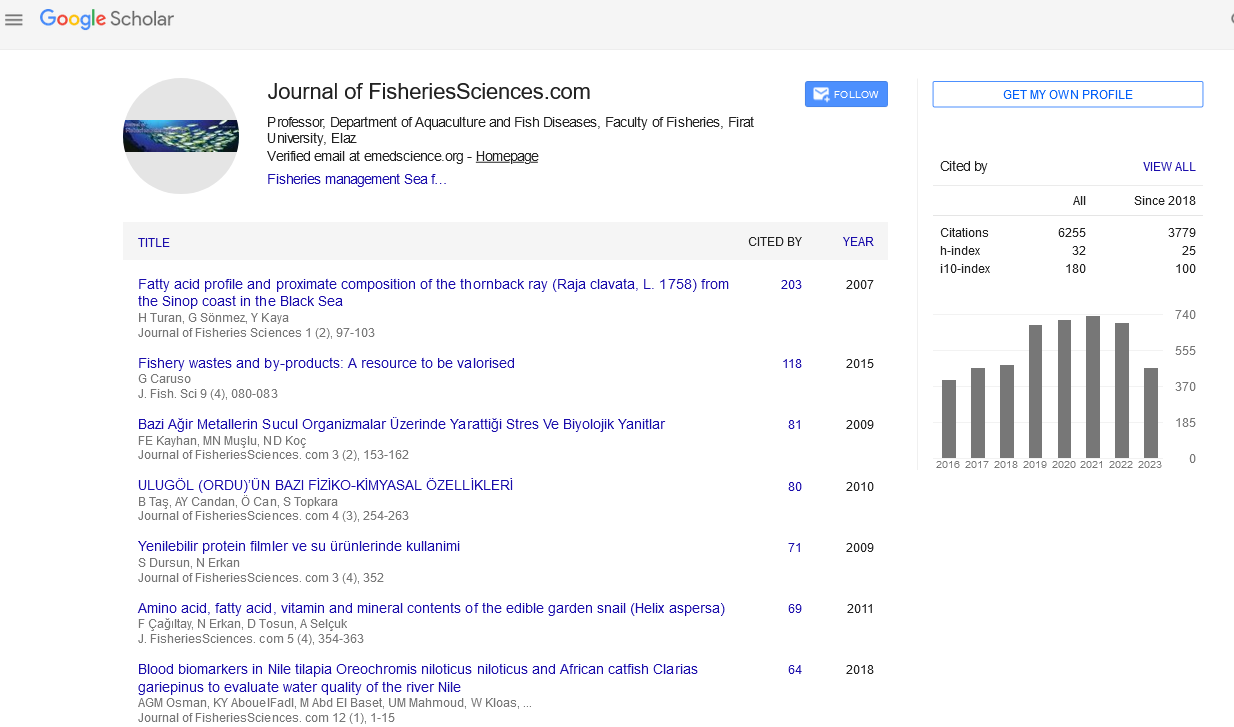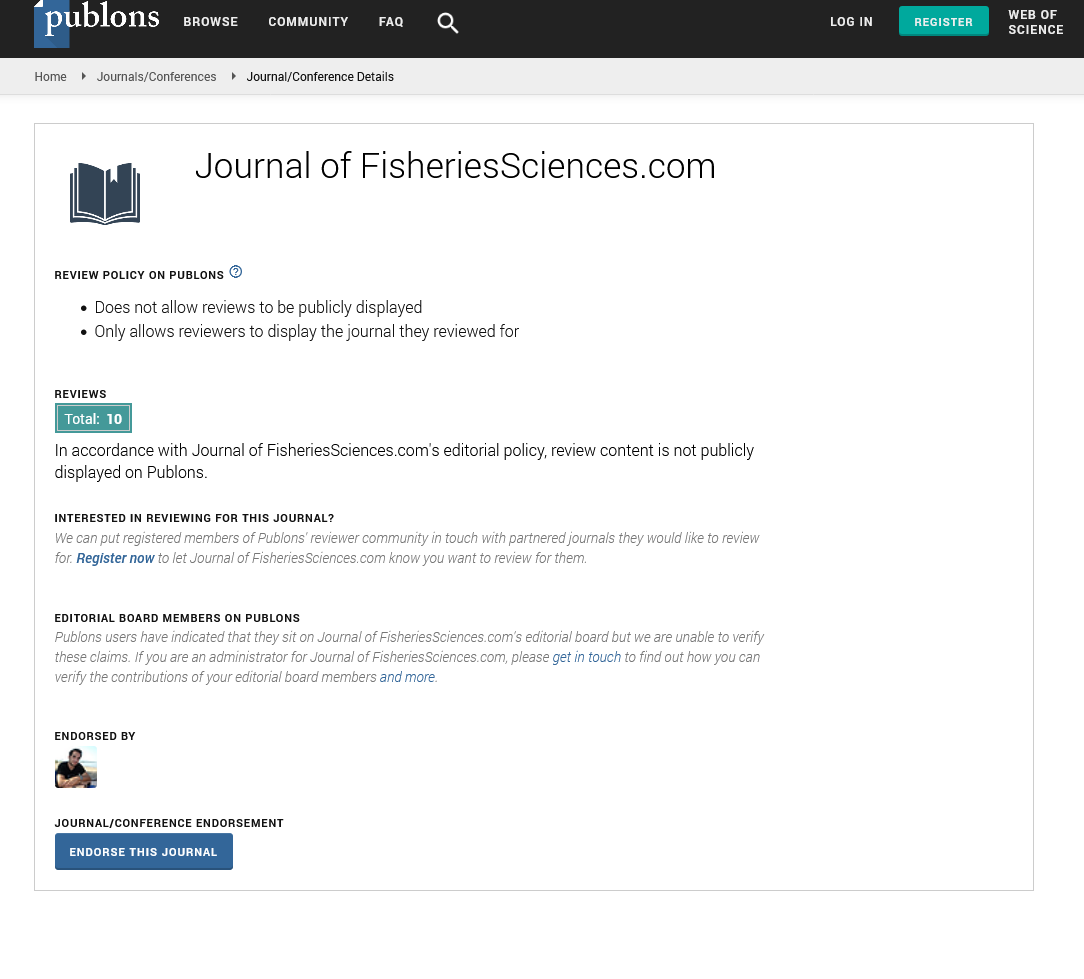Perspective - (2024) Volume 18, Issue 2
Preserving the Lifeblood of Our Oceans: The Imperative of Fisheries Conservation
Anders Murray*
Department of Fishery Sciences, University of Houston-Clear Lake, Ethiopia
*Correspondence:
Anders Murray, Department of Fishery Sciences, University of Houston-Clear Lake,
Ethiopia,
Email:
Received: 26-Mar-2024, Manuscript No. IPFS-24-14700;
Editor assigned: 28-Mar-2024, Pre QC No. IPFS-24-14700 (PQ);
Reviewed: 11-Apr-2024, QC No. IPFS-24-14700;
Revised: 18-Apr-2024, Manuscript No. IPFS-24-14700 (R);
Published:
26-Apr-2024
Abstract
As the global demand for seafood continues to rise, the
health and sustainability of our marine ecosystems are
facing unprecedented threats. Fisheries conservation has
emerged as a critical endeavor aimed at safeguarding fish
stocks, protecting biodiversity, and ensuring the long-term
viability of our oceans. In this comprehensive article, we
delve into the multifaceted realm of fisheries conservation,
exploring its key principles, strategies, challenges, and the
crucial role it plays in sustaining ocean health and
livelihoods worldwide.
Keywords
Fisheries management; Ecosystem protection;
Capacity building; Overfishing; Stakeholder engagement
Introduction
Fisheries conservation encompasses a diverse set of principles,
policies, and practices aimed at managing fishery resources in a
sustainable manner to maintain ecosystem integrity, prevent
overexploitation, and promote the resilience of marine
ecosystems. At its core, fisheries conservation seeks to strike a
delicate balance between meeting the nutritional and economic
needs of human populations and preserving the ecological
integrity and biodiversity of marine environments.
Key principles of fisheries conservation
Precautionary approach: The precautionary principle forms
the cornerstone of fisheries conservation, advocating for
proactive and preventive measures to address potential risks
and uncertainties, even in the absence of conclusive scientific
evidence. By adopting a precautionary approach, policymakers
can prevent irreversible damage to fish stocks and ecosystems,
mitigating the impacts of overfishing and habitat degradation.
Ecosystem-based management: Ecosystem-Based Management
(EBM) recognizes the interconnectedness of marine ecosystems
and emphasizes the holistic management of fisheries within the
broader context of ecosystem dynamics, habitat protection, and
biodiversity conservation. By considering ecological interactions,
cumulative impacts, and ecosystem resilience, EBM promotes sustainable fisheries practices that maintain ecosystem health
and function.
Science-based decision-making: Fisheries conservation relies
on robust scientific research, monitoring, and data analysis to
inform decision-making processes and management strategies.
Through stock assessments, population surveys, and ecosystem
modeling, scientists can evaluate fishery status, identify trends,
and assess the effectiveness of conservation measures, enabling
evidence-based policy formulation and adaptive management.
Stakeholder engagement: Effective fisheries conservation
requires collaboration and engagement among diverse
stakeholders, including governments, fishery managers,
scientists, fishing communities, environmental organizations,
and consumers. By involving stakeholders in decision-making
processes, fostering dialogue, and incorporating local knowledge
and perspectives, policymakers can develop more inclusive,
equitable, and socially acceptable conservation solutions.
Description
Strategies for fisheries conservation
Fisheries management: Sustainable fisheries management
practices, such as setting catch limits, implementing gear
restrictions, and establishing Marine Protected Areas (MPAs),
are essential for preventing overexploitation, rebuilding
depleted stocks, and conserving critical habitats. By adopting
science-based management measures, governments can
promote responsible fishing practices and ensure the long-term
sustainability of fishery resources.
Ecosystem protection: Protecting essential fish habitats,
preserving biodiversity hotspots, and minimizing habitat
destruction are crucial components of fisheries conservation. By
designating marine reserves, implementing ecosystem-based
zoning, and reducing the impacts of destructive fishing practices,
policymakers can safeguard marine ecosystems and promote
ecosystem resilience in the face of environmental threats.
International co-operation: Given the transboundary nature
of fishery resources, international cooperation and collaboration
are essential for effective fisheries conservation. Through
Regional Fisheries Management Organizations (RFMOs), bilateral
agreements, and multilateral treaties, countries can coordinate conservation efforts, manage shared fish stocks, and combat
Illegal, Unreported, and Unregulated (IUU) fishing activities on a
global scale.
Capacity building: Enhancing the capacity of developing
countries to manage their fisheries sustainably is critical for
global fisheries conservation. By providing technical assistance,
training programs, and financial support, international
organizations and donor agencies can empower developing
nations to improve fisheries governance, enhance monitoring
and enforcement capabilities, and implement science-based
conservation measures.
Challenges and considerations
Despite the progress made in fisheries conservation, significant
challenges remain:
Overfishing: Overfishing continues to pose a significant threat
to global fish stocks, with many fisheries operating beyond
sustainable levels. Addressing overfishing requires comprehensive
management measures, improved enforcement mechanisms, and
enhanced international cooperation to reduce fishing pressure
and rebuild depleted stocks.
Illegal, Unreported, and Unregulated (IUU) fishing: IUU fishing
undermines fisheries conservation efforts by depleting fish stocks,
damaging marine ecosystems, and threatening food security and
livelihoods. Combating IUU fishing requires strengthened
enforcement, improved monitoring and surveillance capabilities,
and enhanced international cooperation to address root causes
and enforce existing regulations.
Climate change: Climate change poses unprecedented
challenges to fisheries conservation, including ocean warming,
acidification, habitat degradation, and altered species
distributions. Adaptation strategies, such as implementing
ecosystem-based approaches, enhancing resilience to climate
impacts, and reducing greenhouse gas emissions, are essential
for safeguarding marine ecosystems and fisheries sustainability
in a changing climate.
Social and economic considerations: Fisheries conservation
must address the social and economic dimensions of resource
management, including the livelihoods of fishing communities,
food security, and equity. Incorporating principles of social
justice, gender equality, and community participation into
conservation policies can promote more equitable and
sustainable outcomes for all stakeholders.
Conclusion
Fisheries conservation is a complex and multifaceted
endeavor that requires concerted efforts from governments,
stakeholders, and the international community. By embracing
principles of sustainability, science-based management, and
stakeholder engagement, we can protect fishery resources,
preserve marine biodiversity, and ensure the health and
resilience of our oceans for present and future generations.
Through collective action and shared responsibility, we can
navigate the challenges of fisheries conservation and pave the
way for a more sustainable and prosperous future for marine
ecosystems and the communities that depend on them.
Citation: Murray A (2024) Preserving the Lifeblood of Our Oceans: The Imperative of Fisheries Conservation. J Fish Sci Vol.18 No.2






